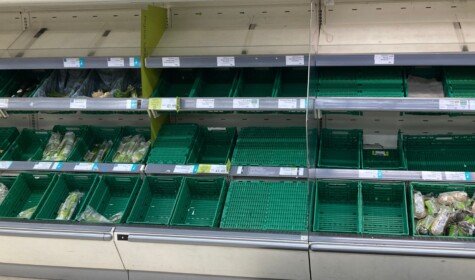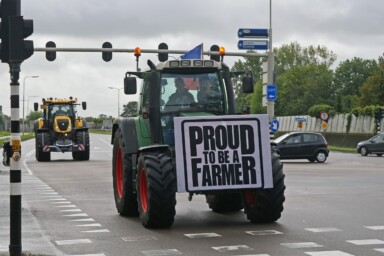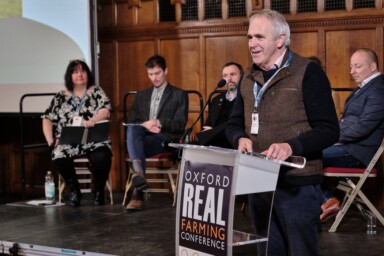As empty supermarket shelves make national headlines, food and farming journalist, Marianne Landzettel, unpicks some of the Brexit-related challenges currently facing UK growers.
On the day that the lack of tomatoes, salad and vegetables on UK supermarket shelves made national headlines, I sent a picture of the empty shelves in the produce section of a supermarket to friends in Germany. Did they face similar issues? No, fruit and veg are quite pricy, but everything is available, was the answer.
A day or so later, Guy Singh-Watson, the founder of what is now Riverford Organic Farmers, posted a video from Hungary, showing shelves laden with fresh produce, including tomatoes and peppers. And in the Saturday, 25th February, edition of Farming Today, Ksenija Simović, the Senior Policy Advisor at the European farming union, Copa Cogeca, confirmed: there are no shortages across Europe. Yes, the weather has been bad, it has impacted growers, particularly in Spain, but over 80% of Spanish produce stays within the EU. As Guy Singh-Watson put it in his video: “The reason people don’t want to export to the UK is that we are a customer of last resort because we are such a pain in the arse to deal with…the paperwork associated with Brexit is expensive [and] time consuming. So, we don’t have any tomatoes, but they do in Budapest.”
Customers in the European Union may still be spoilt for choice, but some fruit and vegetables on their supermarket shelves have become more expensive. It’s the economics of supply and demand, said Jonathan Tremayne from Global Pacific (which sources fruit and vegetables for supermarkets) on Farming Today: “You’ve got a UK market that is inflexible and not very agile and you’ve got a European market that is highly flexible. So, you haven’t got the same issues in Europe because they flex their prices according to supply and demand. UK supermarkets don’t flex their pricing because the customers say, ‘we don’t want to have variable pricing’.”
Cherish the turnip?
Last month, Defra secretary Thérèse Coffey told parliament, “It’s important to make sure that we cherish the specialisms that we have in this country. A lot of people would be eating turnips right now rather than thinking necessarily about aspects of lettuce and tomatoes and similar.” Admittedly, turnips are a very versatile vegetable, but they are not Britain’s only veg. We are currently entering the ‘hungry gap’ which stretches from March to May and even into early June when we have to rely heavily on stored root vegetables such as turnips. But even during the hungry gap, brassicas, pak choi and salad leaves can be grown in polytunnels or unheated glasshouses. Justin King, the former Sainsbury’s CEO, told the Today Programme on Radio 4 that, “This is a sector that has been significantly disrupted by Brexit. If you look at the salad veg, which historically have been grown 52 weeks in the year in the UK under glass…That’s not a sector the government had chosen to supply this winter from an energy point of view, so we are uniquely exposed to imports at this time of year. There is a genuine shortage, but we did rather bring this problem on ourselves.”
No surprises here
British farmers and growers have been warning for many months that there would be shortages if farm gate prices didn’t go up in line with inflation. No business can afford to sell a product for less than it costs to produce, but that is exactly what’s happening in many sectors of British agriculture. It is only a question of time before farmers are forced to scale back production to reduce losses or get out of farming altogether.
In December 2022, the British food and agriculture advocacy group Sustain published an analysis of food prices and profits. “Farmers hold a disproportionately high amount of the risk when it comes to producing food, but receive a disproportionately low amount of the reward, reflecting their relative weakness in the supply chain,” Vicki Hird, the head of Sustain, told Farmers Weekly. Today, carrots are sold for less than they were five years ago. Jack Ward, the CEO of the British Growers Association, told me that “In 2014, a kilogram of carrots in a supermarket sold for 80 pence, in 2017 it was 60 pence and now we are at 40 to 50 pence.”
But if growers factor the rising costs of production into their pricing, they lose out against cheaper imports. Lee Stiles of Lea Valley Growers explains that supermarkets have chosen to source cheaper produce from Spain, Morocco, Turkey and Egypt rather than the UK or EU. Growers across Europe suffer from inflation and higher energy prices, but in Britain, Brexit compounds the problems. Stiles says, “It used to take two days to get a piece of machinery, it can take two weeks now…A lot of drivers don’t want to come here anymore, it’s too hard…The most concerning thing is where the government seems to be more interested in getting retailers together to talk about alternative sources for produce in the future, rather than trying to support British growers to grow more.”
Lea Valley Growers have planted most of the pepper, tomatoes and aubergines for harvest in late April and early May. Cucumbers will be seeded now and ready in about six weeks. But there is likely to be less produce available than last year: “Half of our growers still haven’t decided whether or not to plant because the prices they’ve been offered are rigid and they will be taking a massive financial risk if the weather is not as good as last year.”
The ‘elephant in the room’: a lack of seasonal workers
Fruit and vegetable growers across Europe depend on seasonal labour, in particular at harvest time. Until Brexit, many had longstanding relationships with teams of workers who returned every year. Since Britain left the EU, workers can only come to the UK if they have a seasonal worker visa.
The horticulture sector in Britain needs between 75,000 and 90,000 seasonal workers. In 2022, the government made 38,000 seasonal worker visas available, this year it will be 45,000, with an option for another 10,000 later this year. “If we really have 55,000 seasonal workers available this year, the industry should be in a better situation than last year,” says Ward cautiously. But even if the workers do come, recruiting them post-Brexit adds more costs – from visa and recruitment fees to travel and training: “We can only source labour on a six-month period through the seasonal workers’ scheme. Which means if we are trying to do an 11-month season we have to recruit four times throughout the year,” comments Stiles on Farming Today.
Since Brexit, the lack of seasonal workers has meant that produce could not be harvested: vegetables had to be ploughed under, fruit and berries were left hanging on trees and bushes. At the beginning of February, Tim Malpas, a fruit grower in Kent, told Farming Today that he left 600 bins of fruit (more than a quarter of a million kilos) on trees in 2022 because harvesting was not worth his while. The sums just didn’t add up, he said, costs had risen by 23%, the payment increase by supermarkets was just 0.8%. With an oversupply of imported apples, prices simply collapsed.
Expect more empty shelves and less British produce
Malpas had planned to extend the range of pear and apple varieties and plant 72,000 new trees on an additional 20 hectares of land, but escalating costs, including the increase in wages for seasonal workers, made the expansion impossible. He wants to stay in fruit growing; at times this has meant taking ruthless decisions, but “there aren’t many more avenues to explore for becoming more efficient”.
And so, the cycle continues: British growers reduce production because of increased costs, low margins and labour shortages. Britain as a nation becomes more dependent on imports and if there is a hick-up in an overseas supply chain, such as some bad weather in Spain, supermarket shelves stay empty.
Just how serious the situation is became clear at the end of November 2022 in a speech by the former head of the secret service, MI5, Lady Manningham-Buller: “I argue that food is part of our national security, including those ‘essential workers’ who grow and harvest it and produce crops, vegetables, fruit and even wine.” Commenting that food production in the UK had been taken for granted for too long and now constitutes a weakness in the nation’s security, she continued, “The doubling of fertiliser prices, soaring energy costs, shortages of seasonal workers, plus apprehension about trade deals that may favour places where farming standards are low and imported supplies liable to disruption – all are impacting the farmers that produce our food.” It is clear that addressing these challenges through policy reform must now become one of our most urgent priorities.







